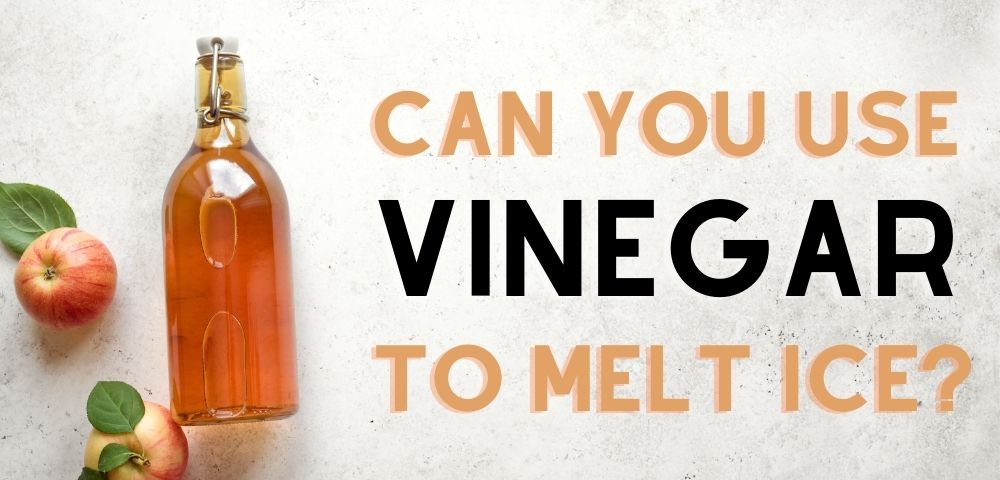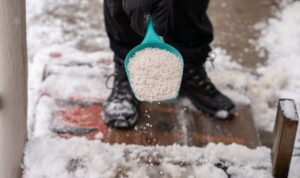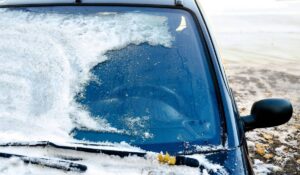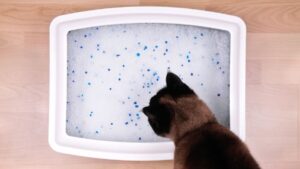Most people use vinegar regularly to clean things around the home. Whether it is removing mildew from the bathroom walls or getting black stains off a pan that had been on the gas for too long, vinegar is a staple in most households. But can vinegar be used to melt the ice in your driveway? If so, how do you use vinegar to melt ice?
Vinegar can be used to melt ice. Although vinegar should not be used on all surfaces, it is safe to use on concrete pavers and driveways. Make a water and vinegar mixture and spray it on the ice to melt ice. Vinegar can be used to prevent ice from forming on a windshield.
Even though vinegar can melt ice, it cannot be poured directly onto concrete or windshields. In this article, we will inspect how vinegar melts ice. We will also delve into how vinegar can melt ice and whether it is safe to use vinegar solution around plants and pets.
How Does Vinegar Melt Ice?
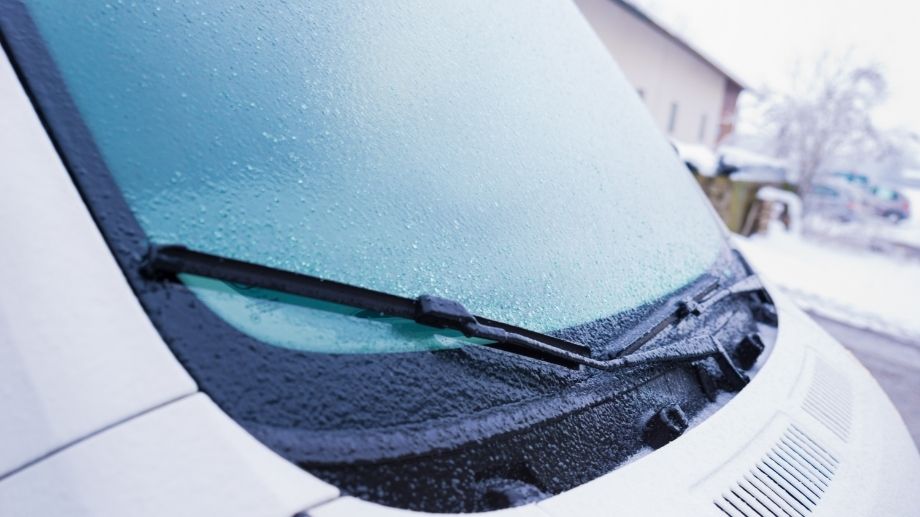
Vinegar works to melt ice by dropping the melting point of ice. The acetic acid in vinegar works by lowering the melting point of ice. By doing so, the ice will start to melt at a lower temperature. Therefore, applying a vinegar solution to ice will cause the ice to start melting, despite the outside temperatures not being warm enough to melt the ice.
For this reason, vinegar can also be used to prevent a car’s windshield from freezing over. Spraying a vinegar solution on a windshield at night will prevent ice from forming on the windscreen because the water will only freeze at a lower temperature. It is a more effective method of removing ice from a windshield than scraping it off the following day.
Vinegar works great for melting ice. However, you cannot simply apply vinegar straight onto a surface and expect the ice to melt. The vinegar solution needs to be adequately prepared.
How To Use Vinegar To Melt Ice
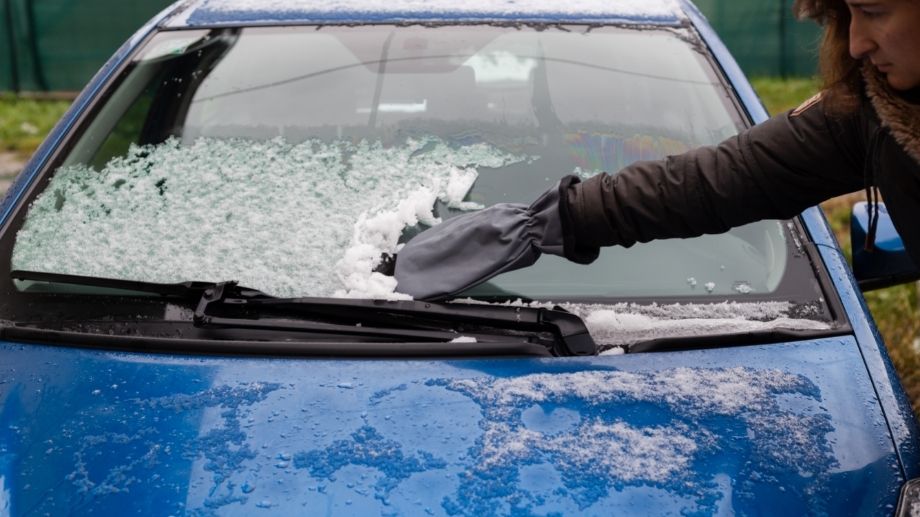
Since vinegar is very acidic, it can cause harm to a surface if it is applied directly onto it without being diluted. We will discuss which surfaces vinegar should not be used on later. But, first, you should remember that vinegar should be diluted before using it on any surface.
To make a vinegar mixture to melt ice, you can mix one part vinegar and one part water. Then, use a spray bottle and spray the vinegar solution over the area you wish to melt. If the ice is very thick, you can add more vinegar to the solution. However, avoid using only vinegar because it contains too much acid, and the vinegar can harm your surfaces.
To make the solution even more effective, mix in some wood ash. Mix two cups of wood ash with water and let the mixture stand overnight. The following morning, remove any floating debris from the mixture, add the same amount of vinegar as water and pour the solution into a spray bottle. Do not add any of the sediment to the spray bottle.
The addition of wood ash helps the ice melt faster and prevents the surface from freezing over the next day. Wood ash is also beneficial for plants.
Keep in mind that although a vinegar solution is used to melt ice, it will not cause your driveway to be less slippery. Be careful when walking on a surface where the ice is melting. To help you keep your grip, you can sprinkle some birdseed or cat litter on your driveway. When the snow and ice melt, the birdseed and cat litter will help to give you some extra grip and prevent you from slipping.
If you use vinegar on surfaces outside, you might wonder if the vinegar solution is safe for plants and pets.
Is Vinegar Safe To Use Near Pets And Plants?
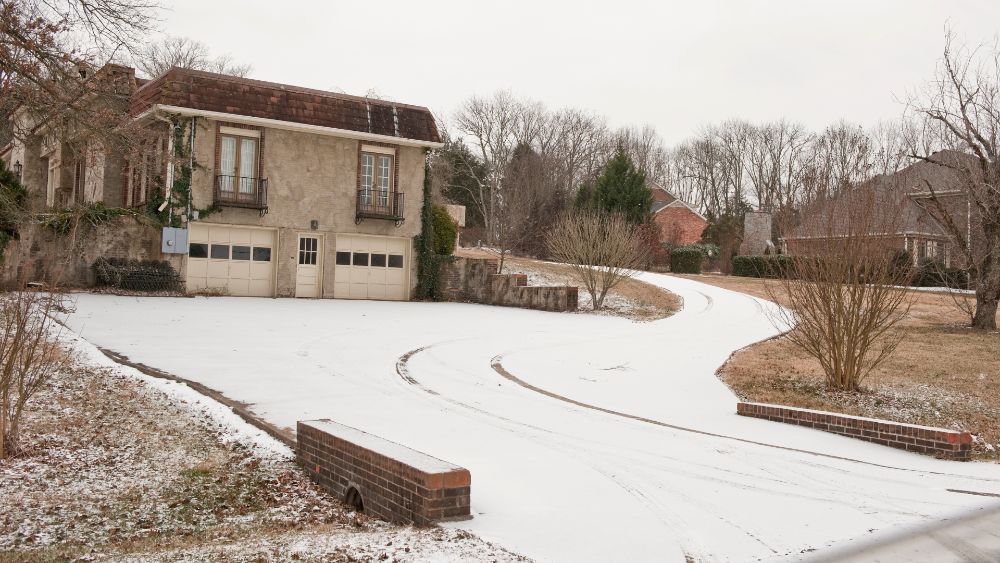
Due to the high acidity level of vinegar, you might be concerned that it is harmful to plants or pets. Well, you are not entirely wrong to be concerned.
Vinegar is harmless to pets. They might not enjoy eating vinegar, and the smell might be very sharp for them. But vinegar is entirely non-toxic and safe to use around pets and small children.
However, vinegar is not safe to use around plants. The acidity level of vinegar will burn the plants and cause them to die. Vinegar is also not specific about which plants it targets. Therefore, it is best to keep vinegar away from your lawn or garden. You should never use vinegar to remove ice from a lawn. It will kill the grass and any other plants it comes in contact with.
What Surfaces Should You Not Use Vinegar On?
Although vinegar is safe to use on paving and concrete outside, it is not safe on all surfaces. The vinegar can dissolve the protective layer on some surfaces and cause damage to the surface. Here are some surfaces on which you should not use vinegar:
- Stone or concrete floors. While concrete itself will not be harmed by vinegar, a sealant coat on the concrete will. Therefore, if your concrete is coated, it is best to stay clear from vinegar. Stone floors should be treated the same. Depending on the type of stone, you might want to avoid using vinegar altogether.
- Ceramic tile floors. Although ceramic tiles will not sustain any damage from vinegar, the grout used between them will. The grout will start crumbling and disintegrating if you use vinegar on it.
- Hardwood floors. The vinegar's acid will break down the finish on hardwood floors, causing the wood to be exposed to water damage and staining.
While vinegar does a good job of melting ice on your paving and driveway, it is best not to use a vinegar solution to melt ice on any of the above surfaces. There are various other DIY methods for melting ice that you can explore. Some of these methods are safe to use on the above surfaces.
Conclusion
Vinegar can help the ice melt faster by lowering the melting temperature of ice. For example, you can use a vinegar solution to melt ice in a driveway or paving. Additionally, you can use a vinegar solution to prevent ice from forming on your windshield.
However, do not use vinegar on grass or near plants as the acid in the vinegar will kill the plants. Also, avoid using vinegar solution on hardwood floors, ceramic tiles filled with grout, and coated stone or concrete floors.

